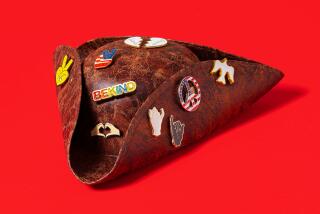The economy of affection
- Share via
WHEN THINGS go sour -- and you know they’re bound to -- whom will you turn to for consolation and advice?
One good answer: “my friends.” But a new study reveals that we live in an increasingly friendless society. In 1985, nearly three-quarters of survey respondents said they had a friend in whom they could confide. In 2004, only half said they could rely on such support.
So what, you say, there’s always family. But as nice as that sounds -- and as hard as this is to believe in a society that tends to deify family -- that’s not particularly great for the American way.
In the mid-19th century, Alexis de Tocqueville observed what he thought was the influence of democracy on families in the United States. “In America,” he wrote, “the family, if one takes the word in its Roman and aristocratic sense, no longer exists.” He noted that a “new relationship has evolved ... and that paternal authority, if not abolished, has at least changed form.”
In other words, “as soon as the young American begins to approach man’s estate, the reins of filial obedience are daily slackened. Master of his thoughts, he soon becomes responsible for his own behavior.”
What Tocqueville did not say was that although democracy weakened the family structure, a relatively weak family structure is good for democracy.
Scholars long have observed that although the family unit is the “nucleus of civilization,” when family interests are held to be more important than those of the individual, it can have a dampening effect on market economies and democracies. That’s because if we trust only our family members, it will be difficult for society to form the kind of political associations and economic enterprises crucial to the well-being of a democratic, capitalist nation.
As it turns out, capitalism and democracy not only need these relationships, they also foster them.
Our collective tendency to romanticize pre-modern life leads us to believe that people were friendlier before the advent of capitalism. But recent studies suggest that relationships in pre-capitalist England were frequently characterized by caution and suspicion. Trust among strangers required the exchange -- the social mixing -- of the marketplace.
By the 20th century, more types of employment than ever depended on the ability to win friends and influence people. Whereas the average person’s well-being once was entirely dependent on his family (and his mastery of the physical environment), he now increasingly relied on his ability to gain the favor of strangers.
But if the market economy is so good at throwing strangers together and creating friendships, then what’s the problem today?
The authors of the friendship study suggest that the marketplace has its limits when it comes to human bonding. Increased professional responsibilities, including the need to work two or more jobs, and long commutes sometimes leave people too tired to cultivate non-family ties.
Even capitalism’s (and self-interest’s) great 18th century cheerleader, Adam Smith, recognized that the emphasis on contracts and the bottom line in economic affairs had the power to undermine human relationships.
In other words, although the relative trust of strangers is required for free-market capitalism, the capitalist system itself can devalue the very idea of friendship.
In order to push back against all that, I propose that we collectively acknowledge the significance of the almost hidden economy that we negotiate every day: the economy of affection.
It’s a lot like the idea of social capital that Robert Putnam popularized in his book “Bowling Alone” -- the fabric of our connections to one another. But the economy of affection is more intimate, less about the Boy Scouts and Parent-Teacher Assoc. meetings and more about drinking buddies and ladies who lunch.
It’s a term borrowed from a study on African peasantry; I use it broadly to refer to the tangled, informal network of mutual kindnesses and small favors that help us negotiate our lives. It is an economy whose currency is gestures and salutations -- and the occasional office birthday card -- rather than contracts, legalities and dollars and cents. It’s a concept of friendship and friendliness that makes jobs, buying your groceries and all the transactions of life more tolerable.
The general decline in friendship should concern us all. Therefore, you shouldn’t be afraid to tell your spouse and family that tonight you’ll be going out with friends. After all, it’s for the good of the country.






